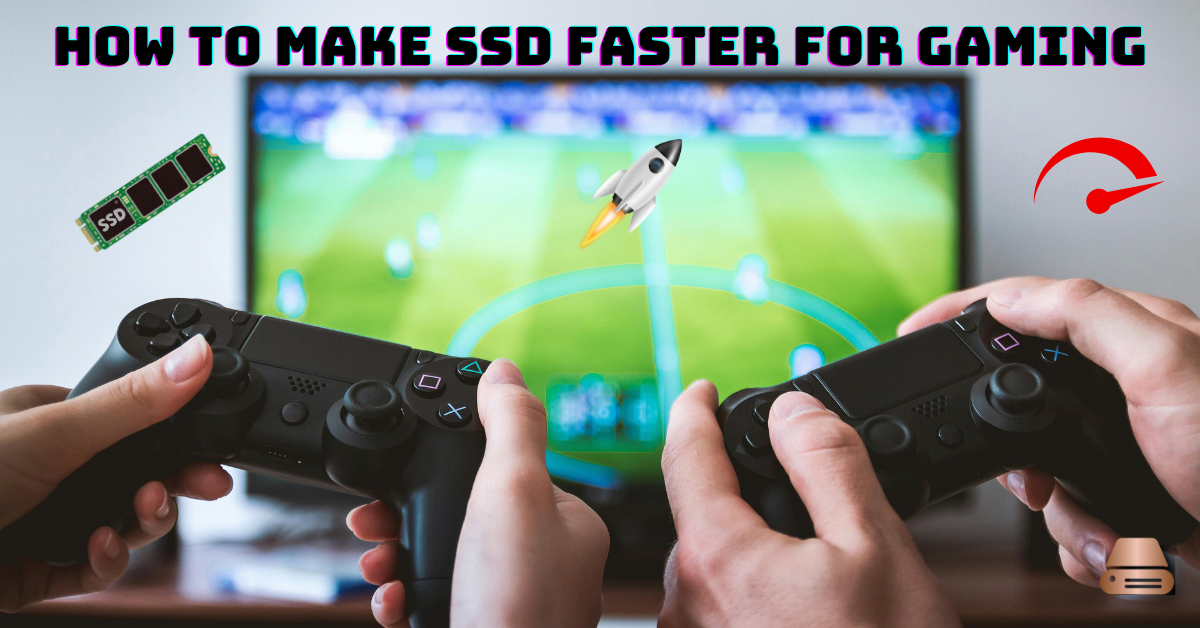Solid-state drives (SSDs) are the backbone of modern gaming systems due to their speed, reliability, and efficiency. However, even the fastest SSDs can slow down over time if not properly maintained. This guide covers How to make SSD faster for gaming, and the best strategies to maximize SSD performance for gaming, ensuring you enjoy smoother and faster gameplay.
Understanding SSD Technology
What is an SSD?
A Solid-State Drive (SSD) is a storage device that uses flash memory to store data. Unlike traditional Hard Disk Drives (HDDs), SSDs have no moving parts. This design enables them to deliver faster data access, better durability, and quieter operation.
Types of SSDs: SATA, NVMe, PCIe
- SATA SSDs:
- These are widely used and compatible with most devices.
- They are slower compared to modern standards, with speeds around 500 MB/s.
- NVMe SSDs:
- These connect directly to the motherboard via the PCIe interface, delivering speeds up to 7000 MB/s.
- It is ideal for gaming due to reduced latency and high bandwidth.
- PCIe SSDs:
- Advanced storage that supports high-end gaming rigs.
- Offers exceptional read/write speeds and low power consumption.
How SSDs Differ from HDDs
- Speed: SSDs are significantly faster than HDDs.
- Durability: SSDs are more robust as they lack moving parts.
- Cost: SSDs are pricier per gigabyte than HDDs.
- Noise: SSDs operate silently compared to the mechanical noise of HDDs.
Importance of SSD Speed in Gaming
Faster Load Times
SSDs dramatically reduce game loading times, allowing players to dive into their favorite games almost instantly.
Reduced Stuttering
With faster data access, SSDs ensure smoother gameplay by eliminating stutters caused by data lags.
Enhanced Gaming Experience
Optimized SSDs lead to quicker boot times, seamless updates, and smoother graphics rendering, offering an unparalleled gaming experience.
Diagnosing Current SSD Performance
Tools to Measure SSD Speed
- CrystalDiskMark: A free tool for testing SSD read/write speeds.
- Samsung Magician: Monitors performance and health of Samsung SSDs.
- AS SSD Benchmark: Evaluates SSD performance in various scenarios.
Recognizing Performance Bottlenecks
- Slow loading screens or in-game delays often indicate bottlenecks.
- Older SSD models may struggle to keep up with newer, larger games.
Signs Your SSD Needs Optimization
- Slow boot times.
- Extended game loading durations.
- Decreased write speeds during file transfers.
Optimizing Your SSD for Gaming
Updating Firmware
Firmware updates from the manufacturer can fix bugs and improve performance. Check the SSD brand’s official website for updates.
Enabling TRIM Command
TRIM ensures that unused data blocks are cleared, maintaining optimal speed. Most modern operating systems enable this by default, but you can manually verify its status using system settings.
Checking for Overprovisioning
Overprovisioning reserves extra space to improve performance and longevity. Use SSD management tools provided by the manufacturer to enable this feature.
Configuring Your Operating System
Disabling Indexing
Indexing can consume SSD resources unnecessarily. Disable it by:
- Right-clicking the drive in File Explorer.
- Selecting “Properties” and unchecking “Allow files to be indexed.”
Turning Off Prefetch and Superfetch
These features are useful for HDDs but can slow SSDs. Disable them in your system’s services menu.
Adjusting Virtual Memory
Move your system’s virtual memory to a secondary drive (if available) to free up SSD resources.
File and Storage Management
Keeping Your SSD Clean
Regularly delete temporary files and uninstall unused programs. Use built-in tools like Disk Cleanup in Windows to free up space.
Defragmentation and SSDs
Unlike HDDs, SSDs do not require defragmentation. Defragmenting an SSD can reduce its lifespan.
Hardware Upgrades for SSD
Increasing SSD Capacity
Consider upgrading to a higher-capacity SSD to accommodate modern, storage-heavy games.
Choosing NVMe over SATA SSDs
If your motherboard supports it, switch to NVMe SSDs for better gaming performance.
Cooling and Longevity of SSDs
Proper Ventilation
Ensure your system has adequate cooling to prevent the SSD from overheating.
Monitoring SSD Health
Use tools like CrystalDiskInfo to check SSD health and address potential issues before they escalate.
Avoiding Frequent Write Cycles
Minimize unnecessary data writing, as frequent write cycles can reduce SSD lifespan.
Conclusion
Optimizing your SSD can transform your gaming experience by delivering faster load times, reducing stuttering, and enhancing system responsiveness. Follow these tips to maintain peak SSD performance and enjoy a smoother gaming journey.
FAQs About How to make SSD faster for gaming
What games benefit most from SSD storage?
Open-world and graphically intensive games gain the most from SSDs.
Can I use an external SSD for gaming?
Yes, but ensure it’s connected via USB 3.0 or Thunderbolt for optimal speeds.
Are NVMe SSDs worth it for gaming?
Absolutely, especially for high-end and competitive gaming setups.
How often should I check my SSD’s health?
Monitor your SSD monthly using tools like Samsung Magician.
Does defragmenting an SSD improve gaming performance?
No, defragmentation can harm SSDs. Instead, rely on TRIM.
